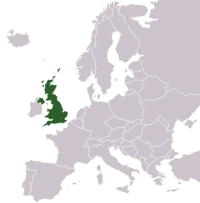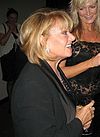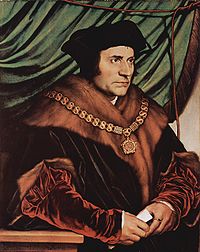
Portal:United Kingdom
- Wikipedia portals: Culture
- Geography
- Health
- History
- Mathematics
- Natural sciences
- People
- Philosophy
- Religion
- Society
- Technology
 |
|
The United Kingdom of Great Britain and Northern Ireland (commonly known as the United Kingdom, the UK or Britain) is a sovereign state located off the north-western coast of continental Europe. The country includes the island of Great Britain, the north-eastern part of the island of Ireland and many smaller islands. Northern Ireland is the only part of the UK that shares a land border with another sovereign state—the Republic of Ireland. Apart from this land border the UK is surrounded by the Atlantic Ocean, the North Sea, the English Channel and the Irish Sea.
The United Kingdom is a unitary state governed under a constitutional monarchy and a parliamentary system, with its seat of government in the capital city of London. It is a country in its own right and consists of four countries: England, Northern Ireland, Scotland and Wales. There are three devolved national administrations, each with varying powers, based in Belfast, Cardiff and Edinburgh, the capitals of Northern Ireland, Wales and Scotland respectively. Associated with the UK, but not constitutionally part of it, are three Crown Dependencies. The United Kingdom has fourteen overseas territories. These are remnants of the British Empire which, at its height in 1922, encompassed almost a third of the world's land surface and was the largest empire in history. British influence can still be observed in the language, culture and legal systems of many of its former territories.
The UK is a developed country and has the world's sixth-largest economy by nominal GDP and seventh-largest economy by purchasing power parity. It was the world's first industrialised country and the world's foremost power during the 19th and early 20th centuries. The UK remains a great power with leading economic, cultural, military, scientific and political influence. It is a recognised nuclear weapons state and its military expenditure ranks third or fourth in the world. The UK has been a permanent member of the United Nations Security Council since its first session in 1946; it is also a member of the Commonwealth of Nations, the Council of Europe, the G7, the G8, the G20, NATO, the OECD and the World Trade Organization.
Maiden Castle is an Iron Age hill fort 2.5 km (1.6 mi) south of Dorchester, in the English county of Dorset. Hill forts were fortified hill-top settlements constructed across Britain during the Iron Age. The earliest archaeological evidence of human activity on the site consists of a Neolithic causewayed enclosure and bank barrow. In about 1800 BC, during the Bronze Age, the site was used for growing crops before being abandoned. Maiden Castle itself was built in about 600 BC; the early phase was a simple and unremarkable site, similar to many other hill forts in Britain and covering 64,000 m2 (690,000 sq ft). Around 450 BC it underwent major expansion, during which the enclosed area was nearly tripled in size to 190,000 m2 (2,000,000 sq ft), making it the largest hill fort in Britain and by some definitions the largest in Europe. In around 100 BC habitation at the hill fort went into decline and became focused at the eastern end of the site. It was occupied until at least the Roman period, and by this time was in the territory of the Durotriges, a Celtic tribe. After the Roman conquest of Britain in the 1st century AD, Maiden Castle appears to have been abandoned, although the Romans may have had a military presence on the site. In the 1930s, archaeologist Mortimer Wheeler undertook the first archaeological excavations at Maiden Castle, raising its profile among the public. Today the site is protected as a Scheduled Ancient Monument and is maintained by English Heritage. ( more...)
Elaine Paige (born 1948) is an English singer and actress, best known for her work in musical theatre. Raised in Barnet, North London, Paige attended the Aida Foster stage school and made her first professional appearance on stage in 1964. Her appearance in the 1968 production of Hair marked her West End debut. Following a number of roles over the next decade, Paige was selected to play Eva Perón in the first production of Evita in 1978, which brought her to the attention of the broader public. The role won her the Laurence Olivier Award for Performance of the Year in a Musical. She went on to originate the role of Grizabella in Cats and had a Top 10 hit with " Memory", a song from the show. In 1985, Paige released " I Know Him So Well" with Barbara Dickson from the musical Chess, which remains the biggest-selling record by a female duo, according to the Guinness Book of Records. She has also worked in film and television. In addition to being nominated for five Laurence Olivier Awards, Paige has won many other awards for her theatre roles and has been called the First Lady of British Musical Theatre. She has released 20 solo albums, of which eight were consecutively certified gold and another four multi-platinum. Since 2004 she has hosted her own show on BBC Radio 2 called Elaine Paige on Sunday. ( more...)
- ... that the Mary Rose was a Tudor period warship that sank during the Battle of the Solent in 1545 and was salvaged (pictured) by maritime archaeologists 437 years later?
- ... that Sir Hugh Norman-Walker was forced to decline the appointment of the Lieutenant Governor of the Isle of Man in 1973 because his wife would not take up the new post with him?
- ... that a skimmington, a custom in which victims were mocked and humiliated in a noisy public procession, occurred in England as late as 1917?
- ... that Princess Alice of the United Kingdom was married to Prince Louis of Hesse in an atmosphere described by Queen Victoria as "more of a funeral than a wedding"?
- ... that as a result of the Scarman report into the 1981 Brixton riots, the independent Police Complaints Authority was established in 1985?
- ... that the archaeological finds from Steeple Langford include a Bronze Age palstave and a Romano-British painted pebble?
- ... that Slade's Case has been called a "watershed" moment in English law?
|
|
|
|
|
|
| Isle of Man |
Ireland | Europe | European Union |
British Empire |
|
The noticeboard is the central forum for information and discussion on editing related to the United Kingdom. |
|
This page lists deletion discussions on topics relating to the United Kingdom. |
Oil-on-panel portrait of Sir Thomas More
by Hans Holbein the Younger ( 1527)
Thomas More was a lawyer and political figure in 16th century England, best remembered as Henry VIII's Lord Chancellor. St. Thomas More was an influential shaper of modern thought, introducing the term Utopia with his novel by the same name, and at the same time a devout Catholic, even embracing ascetical practices such as the use of a hair shirt. He became increasingly firm in his Catholic religious convictions and fell into disfavour with Henry VIII over his refusal to accept Henry as the head of the Church of England. This in turn lead to More's execution at the Tower of London in 1535. On the 400th anniversary of his execution, More was declared a Saint.

- March 13: Heavy snow causes disruption across northwestern Europe
- March 8: Wikinews interviews British scientist Dr Paul Dolman about proposal to cull deer population
- March 1: Liberal Democrats hold onto Eastleigh in by-election as UKIP vote soars
- February 27: Spain starts 2013 IPC Alpine World Championships with first and fifth place finishes
- February 26: France finishes 2013 IPC Alpine World Championships on top of medal ladder
United Kingdom
- Geography
- England, Northern Ireland, Scotland, Wales, Overseas Territories and Crown Dependencies
- Cities, Counties, Towns
- Conservation, Languages, Transport, Visitor attractions
- Culture
- History, Literature, Religion
- Architecture, Entertainment, Museums, Performing arts
- British monarchy, British people
- Archaeology, Society, Science and technology
- Sport
- Economy
- Companies, Energy, Tourism
- Media
- Politics
- Education, Foreign relations, Government, Health, Housing, Law, Law enforcement, Military
- United Kingdom stubs
- British people, British politicians, UK broadcasting, United Kingdom building and structure stubs, UK geography, UK government, UK history, UK organisations, UK schools, UK universities
- UK geography
- UK subdivisions
- British politics
Area based (Subdivisions) Projects
- England
- Scotland
- Wales
- Northern Ireland
- Derbyshire
- Greater Manchester
- London
- Cardiff
- Sheffield
- Yorkshire
- West Midlands
Subject Specific Projects
- Baronetcies
- Clans of Scotland
- Cricket
- Terry Pratchett's Discworld
- Football Clubs
- Sherlock Holmes
- British military history
- Peerage
Vicipéid i nGaeilge na hÉireann - Wikipedia Gaelg - Wikipedia Kernowek - Englisc Wicipædia
- What are portals?
- List of portals
- Featured portals










